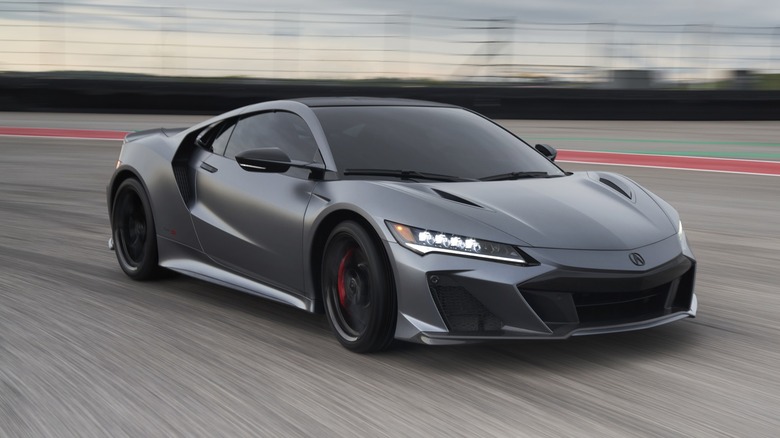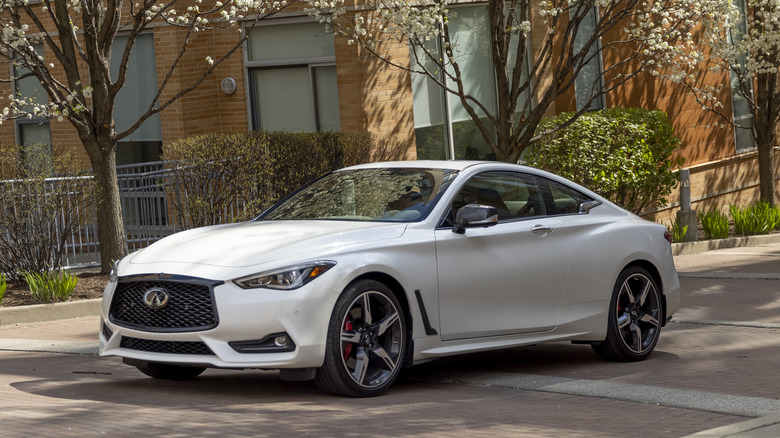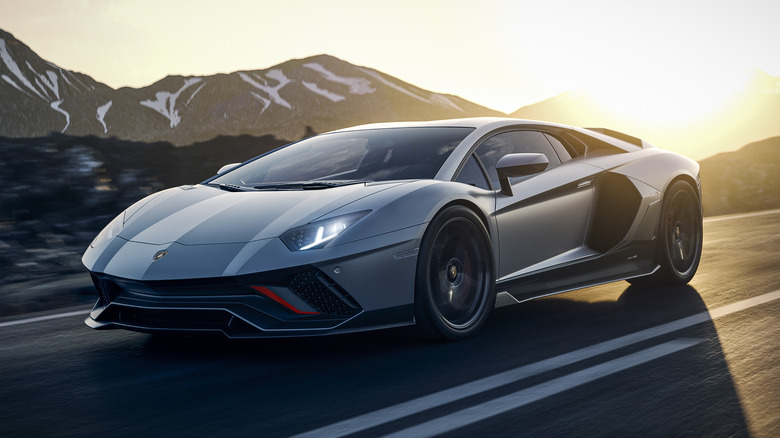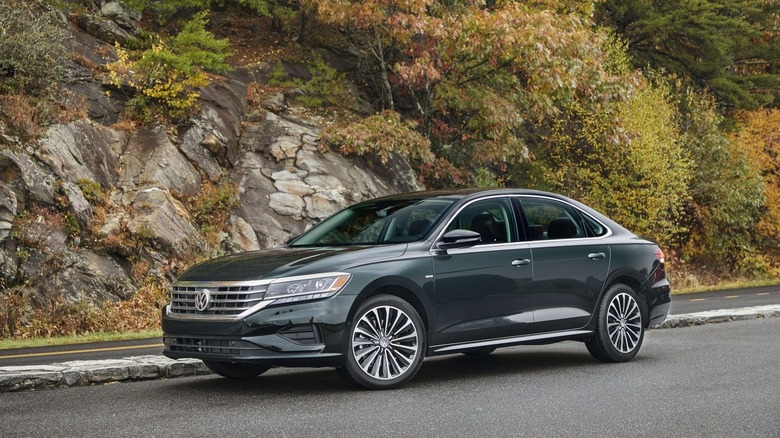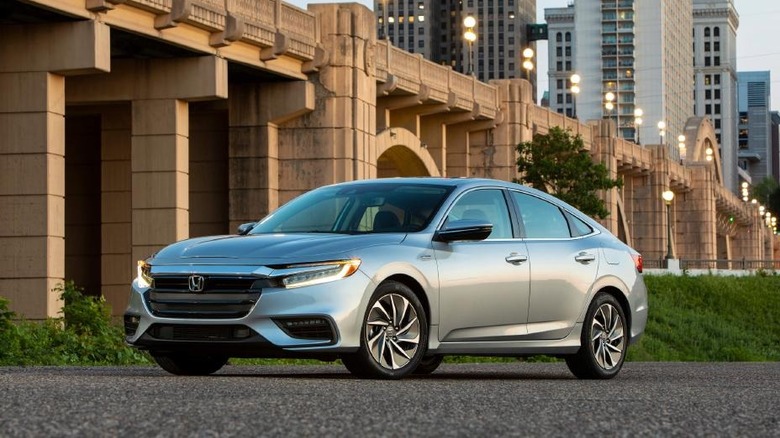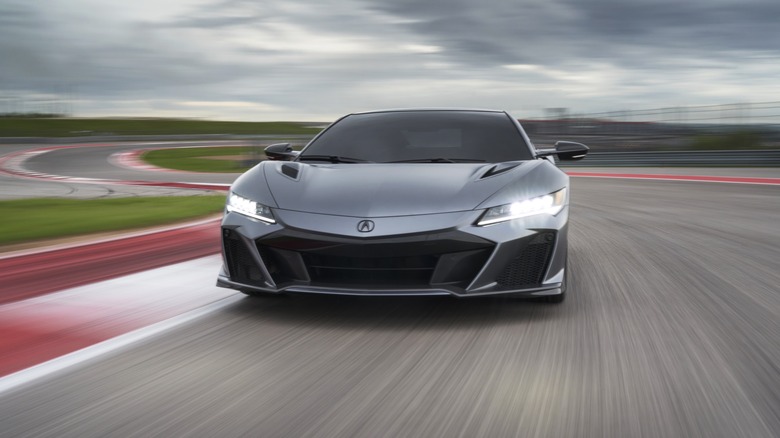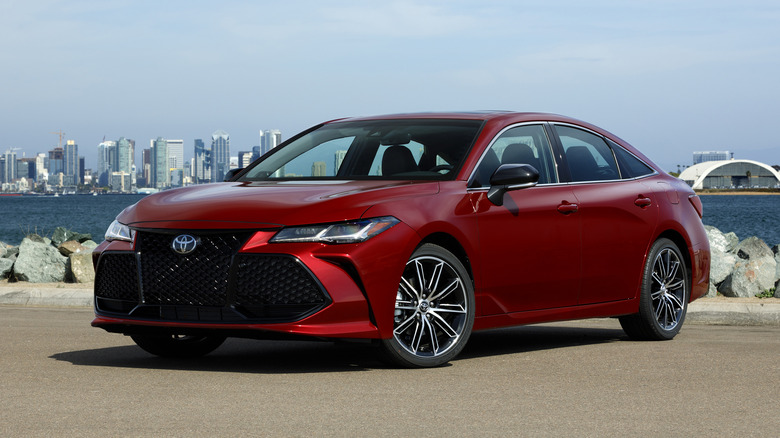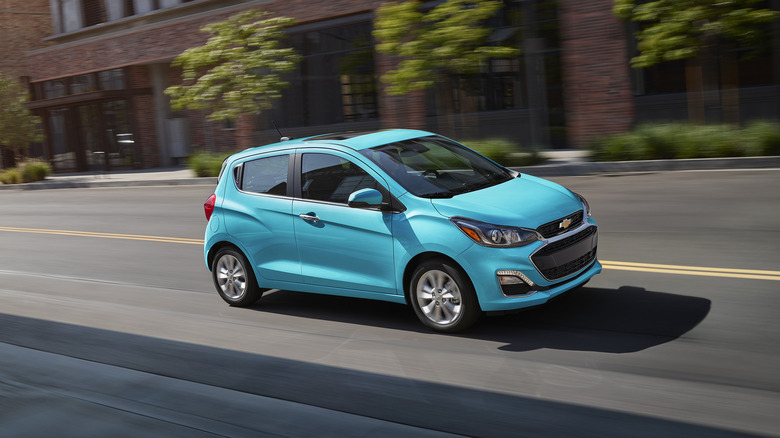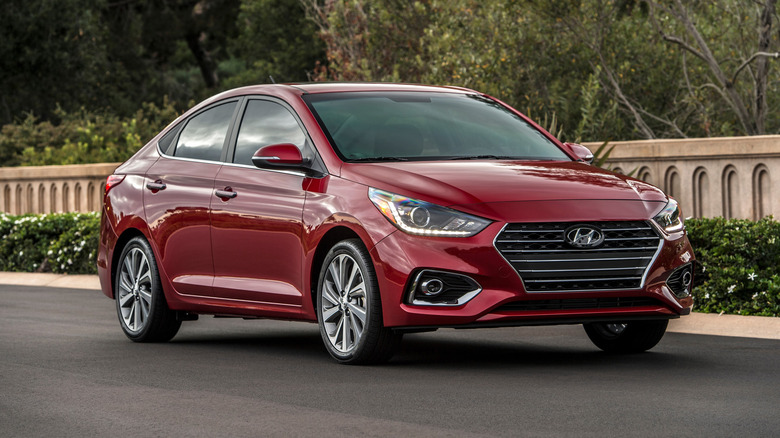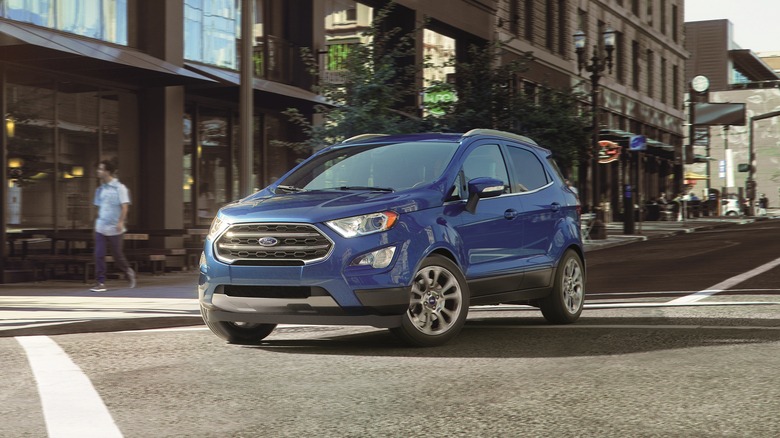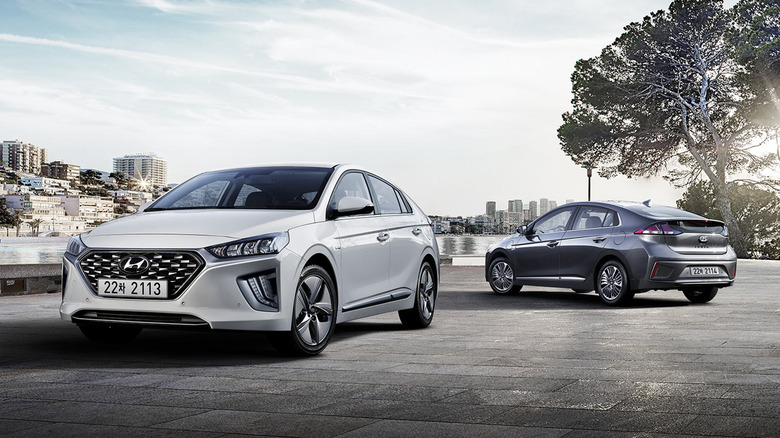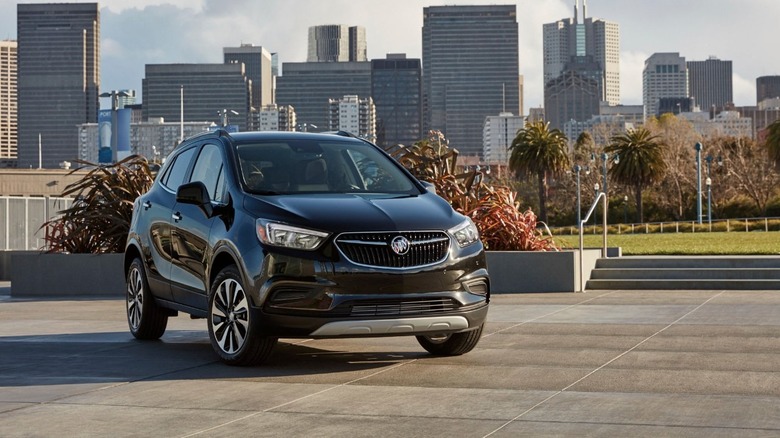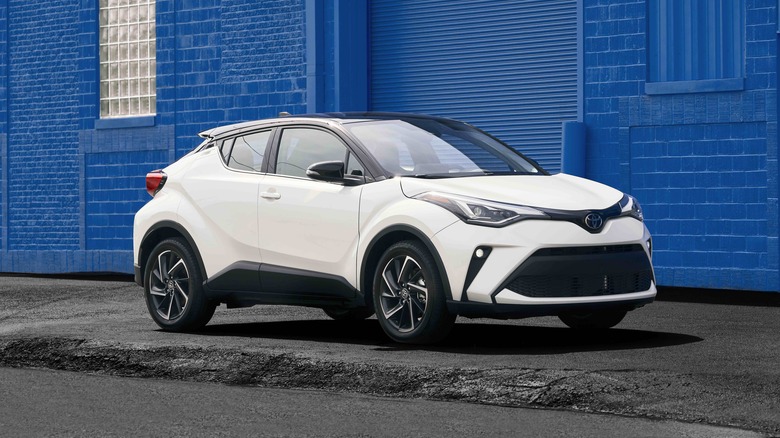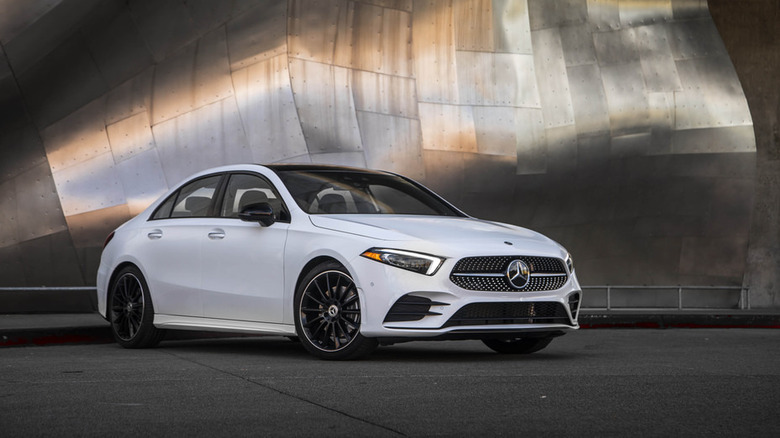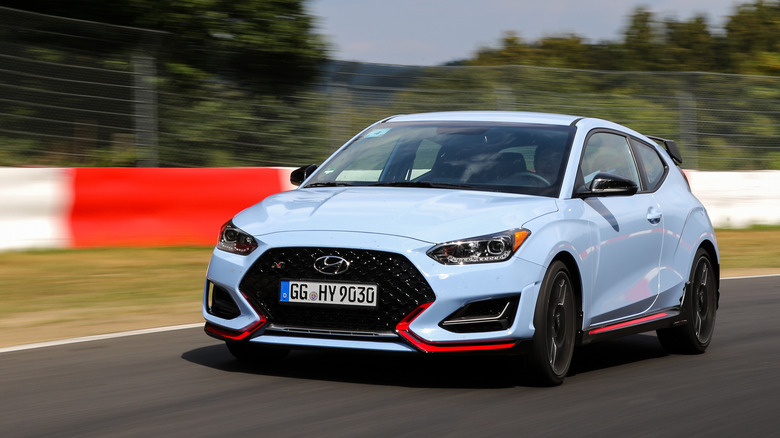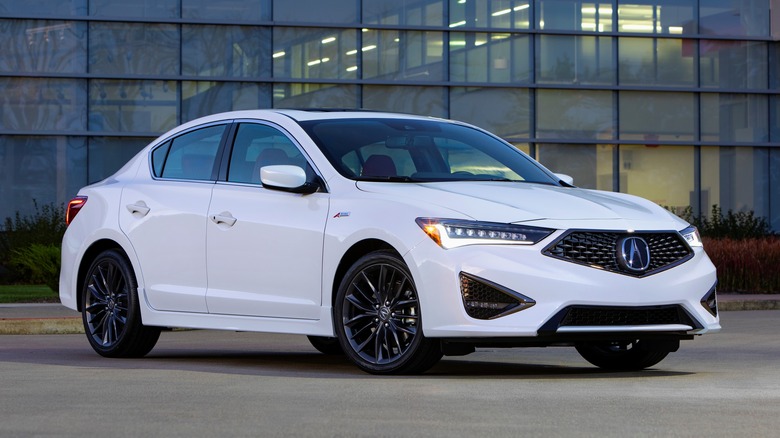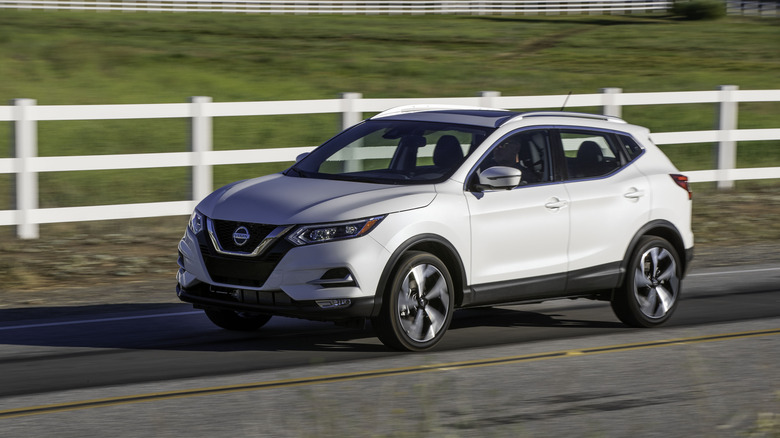Cars That Died In 2023
Changes have swept through the auto industry in recent years as the production of electric vehicles ramps up and consumers continue to switch from traditional body styles like sedans and hatchbacks to SUVs and crossovers. As a result, automakers have been updating their lineups to better reflect the changing times, which inevitably means that older or lesser-selling models end up on the chopping block. In 2022, nearly every major brand saw at least one model killed off, and 2023 is set to be just as transformative.
In many cases, underperforming cars are retired to make way for more popular alternatives, but for a few of 2023's casualties, there will be no successors to the models getting axed. Most are, unsurprisingly, internal combustion cars, but there are also some hybrids being discontinued to make way for incoming all-electric models. It looks like 2024 will see even more revered cars disappear, as the Stellantis trio of the Dodge Charger, Challenger, and Chrysler 300 are all confirmed to be ending production in the latter part of 2023. But for now, here's a roundup of the cars that never made it to the 2023 model year.
Infiniti Q60
The 2022 Infiniti Q60 added a few extra tech features as standard in an attempt to entice buyers, but that didn't get close to addressing the main problem: few people buy sports coupes anymore, and even fewer buy ones with an Infiniti badge on the front. With the brand pivoting to focus on more profitable segments like SUVs and crossovers, the decision was made that the Q60 would not be continued after the 2022 model year, although Infiniti stated at the time that it expected to have stock available well into 2023.
The Q60 lived a relatively short life, debuting in 2017 after the initial concept was unveiled in 2015. We reviewed the 2017 Q60 Red Sport 400 and found it to be a competent, if flawed, car, with the biggest issue simply being that it couldn't outshine its rivals like the BMW 4 Series and Audi S5. Ultimately, its good looks weren't a good enough reason to buy one over the competition, which offered superior dynamics, better tech, and let's face it, a more prestigious badge.
Lamborghini Aventador
With the arrival of the 2024 Revuelto hybrid, Lamborghini bid goodbye to its last-ever purely gas-powered flagship. The Revuelto still packs a V12 engine but pairs it with three electric motors which allow it to drive in all-electric mode in cities or slow-moving traffic. The Aventador made no such concessions, remaining thirsty, loud, and wilfully impractical right up until the end. Lamborghini commemorated the end of the Aventador's 11-year run with the special edition Aventador LP 780-4 Ultimae, which churned out 769 horsepower from its naturally-aspirated V12 engine.
Like the rest of the auto industry, Lamborghini is phasing out internal combustion engines in favor of electric power, with CEO Stephan Winkelmann recently stating that the brand's first all-electric supercar will be unveiled in 2028. The Aventador will no doubt become even more of a collectors' item as the transition takes place, but if you have a few hundred thousand dollars laying around and fancy purchasing a new one, unfortunately, you've already missed the boat.
VW Passat
In recent years, sales of sedans have continued to slump as buyers switch to SUVs and crossovers, and as a result, many long-running models have been killed off. This includes the VW Passat, which was discontinued in 2023 after a 2020 refresh failed to generate enough of a rise in sales. The Tennessee plant producing them has been retooled to produce the ID.4 electric crossover, which was Volkswagen's biggest-selling EV in 2022.
It might be dead in America, but the Passat lives on in Europe, sort of. It's set to continue as a wagon only, with production moving to the same factory that the mechanically-related Skoda Superb is made, in Slovakia. A new generation of the car is set to debut over the summer of 2023, but there's been no indication that the Euro-spec Passat will ever make its way back to American shores. The smaller Jetta sedan, however, remains on sale in the U.S. for now.
Honda Insight
Originally launched in 1999, the Honda Insight survived three generations but was discontinued after 2022. It evolved from an odd-looking car with partly covered rear wheels into a rather unremarkable-looking sedan, and it's perhaps this blandness that sealed its fate. Production ended in June 2022, with Honda promising at the time to replace it with another hybrid model. That successor has now been confirmed to be the Civic Hybrid, which will debut for the 2024 model year.
The discontinued Insight was already based on the bones of the last-generation Civic, so it makes sense for Honda to replace it with a model that shares its name with the best-selling economy car. The 2023 Civic is packed with features that make it one of the best cars in its class, so here's hoping that the 2024 Civic Hybrid will prove to be just as much of a winner as its gas-powered lineup sibling.
Acura NSX
SlashGear drove the 2022 Acura NSX Type S at Daytona International Speedway and crowned it a triumph for the Acura brand, with a more visceral soundtrack and handling that felt more supercar than a souped-up hybrid. In many ways, we felt the Type S was the car that the revived NSX should have been in the first place, an underdog from a brand that changed the landscape of the Japanese sports car industry in the '90s with the original incarnation of the nameplate.
However, these changes were too little, too late, as by the time we drove it, the Type S had already been confirmed as the last iteration of the second-gen NSX. A total of 350 examples were made, all of which were quickly spoken for. Then, just like the original, Acura's flagship was retired, having never hit the sales figures that the brand's bosses were undoubtedly hoping it would. With a decade-long gap between the axing of the first-gen car and the unveiling of the second-gen, it seems fans of the NSX will have a long while to wait until a third generation is unveiled, if it ever is.
Toyota Avalon
Another victim of the shift away from sedans, the Toyota Avalon survived for five generations before getting the chop. The most recent generation debuted for the 2019 model year, and SlashGear was impressed with its comfortable ride and memorable (if divisive) styling. However, that couldn't save it from losing ground to crossovers and SUVs, and as a result, the Avalon was retired and replaced by the 2023 Crown, which arguably sits in an entirely new segment that's somewhere between a traditional sedan and a crossover.
Much like the Avalon, the Crown is available as a hybrid only and with sports a look that should polarize buyers. It does keep the Avalon's gaping front grille, but there are few visual similarities apart from that, with an all-new swooping rear roof design and black wheel arches to highlight the Crown's higher-riding nature. With a successor already in production, it's unlikely that Toyota will bring the Avalon nameplate back for a new generation, but the current-gen car remains on sale in China for now.
Chevrolet Spark
The Chevy Spark was the cheapest new car on sale when it was announced that it would be axed after 2022, with a starting price of just under $15,000. Chevy did not offer a direct replacement, instead directing buyers to the Trailblazer and Trax crossovers, which both started at over $5,000 more. The Spark was one of the very few remaining sub-$20k cars on the market, and as such, it was also one of the most bare-bones. It wasn't powerful either, with an inline-four producing just 98 horses.
Still, it couldn't be beaten in price, which is why it's a shame to see its demise. There are still a handful of new cars on sale that can be picked up for a couple thousand more than the Spark's starting price, with the Nissan Versa and Mitsubishi Mirage among the cheapest. The Versa is decent, the Mirage is... less so, but unfortunately, the car that used to be the cheapest of them all has now been consigned to the used lots as Chevy focuses on higher-margin models.
Hyundai Accent
Much like the Chevy Spark, the Hyundai Accent was an affordable subcompact that was among the cheapest new cars on the market. And also like the Chevy Spark, it was killed off by Hyundai so that the brand could focus on delivering models with higher profit margins. The cheapest Hyundai left in 2023 now that the Accent has gone is the Venue crossover. It looks a little odd but SlashGear found it to be surprisingly competent in 2021, with a longer list of standard tech than you might expect.
Still, that doesn't change the fact that it's several thousand dollars more than the Accent used to be, and not everyone is going to want a tiny crossover. Hyundai claims that anyone looking for a sedan can simply head straight to its Elantra or Sonata models, although the Sonata is rumored to be axed within a few years, as well.
Ford EcoSport
The Ford EcoSport has to have one of the most illogical names of any recently sold car. It's neither sporty nor particularly eco-friendly, with its EPA ratings of 23 mpg city and 29 mpg highway making it one of the least efficient cars in its segment. And yes, Ford did try to claim that the "Eco" in the name should be pronounced "echo" instead, but that doesn't make its name any less silly, nor did it change the way that the majority of buyers read it. Whatever Ford wanted us to call it, there's no doubt that it's deserving of its title of one of the brand's least impressive cars in recent years.
The Indian-built crossover sold relatively well during its first few years on the market, but sales dipped throughout 2021. Ford decided to cease its manufacturing operations in India by mid-2022, and as a result, the EcoSport was killed off alongside it. Few will miss its underwhelming engine, questionable interior quality, and lackluster driving dynamics, although it's a shame that Ford hasn't unveiled an equally affordable successor in its place.
Hyundai Ioniq Hybrid
Hyundai is spinning its Ioniq nameplate into an all-electric sub-brand, with the Ioniq 5 and 6 already on sale and the Ioniq 7 on the way soon. To avoid confusion, the South Korean automaker has axed the hybrid and plug-in hybrid Hyundai Ioniq, having axed the original Ioniq EV in 2021. The 2022 Ioniq Hybrid was one of the cheapest in its segment, with a starting price of $23,600 plus fees. The closest equivalent in the 2023 lineup is the Elantra Hybrid, which starts at a little over $24,000.
The Ioniq Hybrid faced plenty of competition, both from rivals like the Toyota Prius and from internal rivals like the Hyundai Kona and Kia Niro. With several other models in its lineup already offering similar specs for a similar price, it seems Hyundai wanted to simplify things a little, and it was the Ioniq Hybrid that was singled out as the weakest link.
Buick Encore
Both the Buick Encore and its platform sibling the Chevy Trax were discontinued after 2022, but after a year's break, the Trax is set to come back for 2024. The Encore, however, will be given no second chances. Part of the reason for its demise was likely due to its similarity to the Encore GX, which is a larger, more recently refreshed model that's also slightly pricier than the Encore was. Having two crossover models with almost identical names was unnecessarily confusing for buyers, and with the Encore out of the way, Buick is no doubt hoping more customers will opt for the higher-priced Encore GX.
Whether another smaller crossover launches to fill the gap in the lineup has yet to be confirmed, but there's a possibility, especially with the latest-generation Trax set to go on sale shortly. The likelihood of a replacement will probably depend on the demand for such a crossover in China, where Buick now makes most of its sales. If an Encore successor does emerge, it will likely have a different name, as recent leaks from China show that the 2024 Encore GX will drop the "GX" designation and simply be known as the "Encore."
Toyota C-HR
The C-HR never found the sales success that Toyota had hoped it would, lagging behind rivals like the Honda HR-V, Hyundai Kona, and Nissan Kicks. With the introduction of the Corolla Cross, the C-HR also suffered from internal competition, so the decision was made to ditch it for 2023. The Corolla Cross offers less divisive styling, a familiar nameplate, and a slightly lower starting price, giving it a much better chance of succeeding in its highly competitive segment.
It also packs a wider range of engine options than the C-HR, with both hybrid and non-hybrid powertrains available. The C-HR was only offered with a 2.0L four-cylinder making 144 horsepower and front-wheel drive, whereas most rivals offered more horses under the hood and all-wheel drive for better grip in bad weather conditions. Although it's dead in America, a new generation of the car will be launched in Europe based on the C-HR Prologue concept that recently did the rounds at auto shows.
Mercedes-Benz A-Class
The cheapest new Mercedes-Benz was discontinued for 2023 as it struggled to find buyers, with 2021 sales slipping to less than half what they were just two years prior in 2019. The trouble was, not only was it competing with rivals from BMW and Audi, but it also had internal competition in the form of the CLA and GLA. The CLA is slightly pricier but now acts as Mercedes' entry-level model in the wake of the A-Class' departure.
The GLA is the brand's entry-level crossover, and is significantly more successful than the A-Class sedan, selling around 14,000 units in 2021 as opposed to the latter's 8,000 units. That leaves an increasingly small pool of entry-level premium cars, with the BMW 2 Series Gran Coupe and Audi A3 sedan among the remaining offerings on the market. As automakers switch to EVs and try to direct buyers into bigger cars in search of higher profit margins, there's no guarantee that either of those two will stay around much longer either.
Hyundai Veloster N
After previously axing the base-spec Veloster, Hyundai also discontinued the hot hatch Veloster N for 2023, leaving the Elantra N and Kona N as the two remaining N-branded cars in its lineup. The front-wheel drive hatchback, first introduced in 2011, was last — and impressively — refreshed in 2021. Not only was it fun to drive with a stick, but it was also one of the very few cars of its size that was still just as enjoyable with Hyundai's DCT.
That should have opened it up to a whole new audience of buyers who would usually be put off buying a hot hatch by the requirement of a manual 'box to have fun, but unfortunately, it seems Hyundai couldn't tempt enough of those buyers into showrooms. Sadly, that meant the end of the Veloster N, leaving Hyundai to join the increasing ranks of manufacturers without a sporty hatchback in their lineup, at least not in America.
Acura ILX
The Acura ILX was discontinued for 2023 in preparation for the new Integra, which effectively replaced it in the lineup. The ILX debuted for the 2013 model year and served as the most affordable point of entry into the Acura range. SlashGear drove the new Integra and found it to be a significant improvement over the outgoing ILX, striking the balance between daily driveability and genuine hard-edged sportiness. It packs the same 1.5L engine as the Civic Si, and like its Honda-badged sibling, is also rated at 200 horsepower.
That's an almost identical power output to the 2022 ILX, which packed 201 horses from a larger 2.4L inline-four-cylinder engine. So, it seems the 2023 Integra acts as a direct replacement to the ILX in all but name. Acura will surely be banking on the fact that reviving a revered nameplate will draw in more buyers than the Integra's predecessor, but with that comes plenty of hype and expectations from enthusiasts. The version we drove mostly did live up to that hype, but it remains to be seen if enough buyers will agree.
Nissan Rogue Sport
After only a few years on sale, the Nissan Rogue Sport was axed for 2023 as Nissan sought to trim the fat off its lineup. It was originally intended to be an entry-level vehicle for younger buyers, but it failed to capture much interest. Perhaps that was partly due to its name — despite initial appearances, the Rogue Sport was an entirely different model to the pricier Rogue, which itself benefitted from a recent overhaul. Adding "Sport" to the name also implies a level of athleticism that the Rogue Sport could never hope to achieve, with its 2.0L four-cylinder engine pumping out an underwhelming 141 horsepower.
Production of the car ceased in December 2022, with sales continuing for a few months more until inventory had been cleared. Few will mourn its death, especially since the larger Rogue lives on and the subcompact Kicks continues to provide an entry point to the brand's range of SUVs and crossovers.
